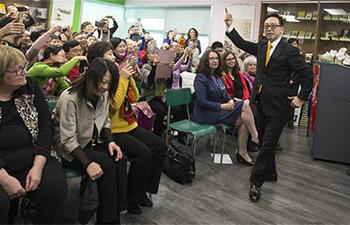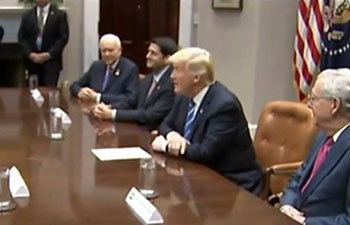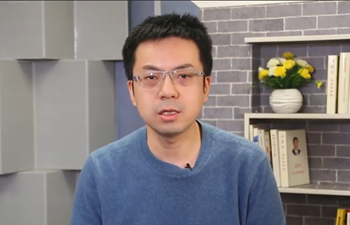by Peter Mertz
DENVER, the United States, Feb. 1 (Xinhua) -- Hours after one-year U.S. President Donald Trump's first State of the Union address, political pundits called into question the protectionist theme that flowed through his speech.
"SOMEWHAT AMBIVALENT"
"Almost a century ago, the United States triggered a global economic depression and arguably a world war by the highly protectionist Smoot-Hawley Tariff Act - and Trump has the same mentality," said David Richardson, former Capitol Hill policy wonk.
Trump's 80-minute speech used "tough trade talk" as a central message of the third longest State of the Union speech in 50 years.
"Protectionist measures like that will not help the U.S. economy and will only antagonize U.S. trading partners like China," Colorado State University political science professor Peter Harris told Xinhua Thursday, adding that signs from the Trump administration were ambiguous thus far.
Harris, a frequent national TV analyst, noted that America's 45th president spoke in "vague terms about renegotiating trade deals and intellectual property, a remark likely aimed at China."
"But he didn't dwell for long on the subject...and I also think there are some signs that his administration is somewhat ambivalent about the idea: this isn't an all-out assault against China on trade, and is a far cry from what Trump promised on the campaign trail," Harris said.
Harris, who has authored articles on China for Newsweek, Salon, and U.S. News and World Report, called Trump's overall comments "restrained."
"It would be wrong to argue that Trump used his address to paint China as a significant threat to the U.S. He didn't. He spent much more time talking about ISIS, for example," Harris said.
"STUPID MOVES"
Harris is hopeful, as are many, that Trump will steer away from an all-out trade war, although others are not so confident.
"The tough-talking American leader effectively declared a trade war against the world, particularly export-oriented nations in Asia," Hong Kong-based South China Morning Post said Wednesday.
"Almost overnight, Trump has poisoned historically warm relations with its strategic allies in Europe, Asia and Latin America, who are expected to sue America in international courts for imposing unilateral trade sanctions," the report said.
"Chalk this up to another of Trump's stupid moves," retired University of Colorado professor John Yee told Xinhua Wednesday.
"First he gives away federally protected land that is sacred to Native Americans in Utah to his wealthy oil and gas friends, then he tries to lease ocean areas off America's coastlines for more fossil fuel exploration - both so stupid," Yee said.
Yee, a member of the legendary World World II Flying Tigers, said that antagonizing China will hurt the United States more than his native country.
"China passed Japan in 2010 to become the world's No. 2 economy and is predicted to pass America in the next few years," said Yee, who was born in China's Yunnan Province in 1921.
"LESSONS OF HISTORY"
Recent U.S. moves, including actions against Chinese trade of steel, aluminum, and solar panels, have caused alarm in financial sectors that are bracing for China's retaliation.
Last week, when Trump announced a 30-percent tariff on solar panel imports, Forbes called the move "the opening shot in what could turn into a trade war."
"The tariff isn't specifically targeted at China, but that's where most imported solar panels come from," the top U.S. business magazine stated.
"I think that the recent decision to impose tariffs on solar panels and washing machines was a bad move as a whole," Harris agreed.
"So, in my view, the State of the Union address and Trump's recent economic decisions all point in the direction of increased tension with China in the area of trade."
"The lesson of history is clear: trade is central to peace among nations," Yee noted. "It only works if it is treated as a positive-sum enterprise."
In 1930, the United States signed into law a conservative piece of legislation called the Smoot-Hawley Tariff Act that imposed tariffs on more than 20,000 imported goods.
"Here we go again," Yee said.
"That brilliant move worsened the Great Depression and led to global economic destabilization that ushered in World War II. Trump would be wise to look at the lessons of history," he told Xinhua.













